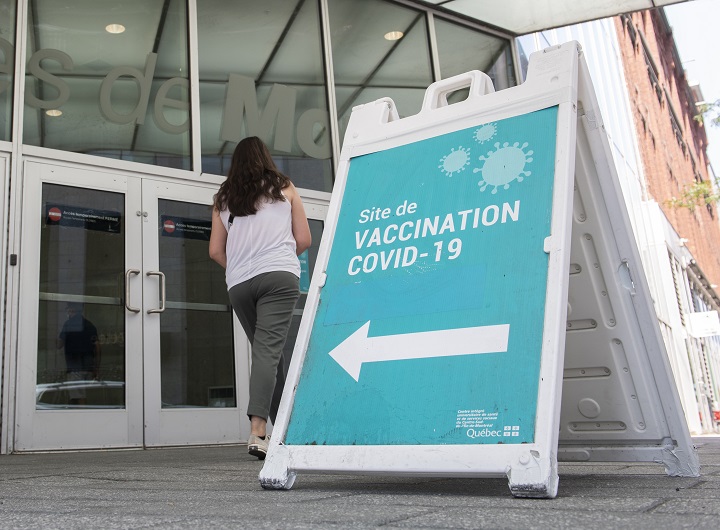COVID-19 vaccines are more effective when the second dose is administered after a longer interval than the one recommended by vaccine manufacturers, according to a new study released Wednesday by Quebec’s public health institute.

Because of a lack of supply, Quebec decided early in its vaccination campaign to administer second doses of COVID-19 vaccine 16 weeks after the first, rather than the 21 or 28 days recommended by vaccine companies.
The new study by the Institut national de santé publique du Québec says the “efficacy against infections increases when the interval between doses is greater than that recommended by the manufacturers.”
For example, the study revealed that the Oxford-AstraZeneca vaccine was 47 per cent effective at preventing infections when the second dose was given three to four weeks after the first, as recommended by the manufacturer. But that efficacy jumped to 92 per cent when the second dose was administered at least 16 weeks after the first.

The study also found that three vaccines — Pfizer-BioNTech, Moderna and AstraZeneca — have been highly effective at preventing deaths related to COVID-19.
“Among the 181 people who died of COVID-19 during the study period, only three had received two doses of vaccine, which results in a vaccine effectiveness against death of over 97 per cent,” according to the study, which was conducted between March 14 and Sept. 11.
Researchers also found that all three vaccines were more than 92 per cent effective at preventing hospitalizations and the effectiveness of each vaccine didn’t change against various mutations of the novel coronavirus, including the Delta variant.
On Tuesday, the institute released a projection stating that new daily infections and hospitalizations across Quebec should stabilize and begin to decline by December — if contacts between people stay the same. It warned, however, that cases and hospitalizations could begin to rise again if social contacts return to pre-pandemic levels.
Meanwhile, Quebec reported 594 new cases of COVID-19 Wednesday and seven more deaths attributed to the novel coronavirus. The Health Department said hospitalizations dropped by 15, to 306, and 91 people were in intensive care, a drop of three.
- Canadian man dies during Texas Ironman event. His widow wants answers as to why
- Invasive strep: ‘Don’t wait’ to seek care, N.S. woman warns on long road to recovery
- ‘Super lice’ are becoming more resistant to chemical shampoos. What to use instead
- Canadians more likely to eat food past best-before date. What are the risks?



Comments